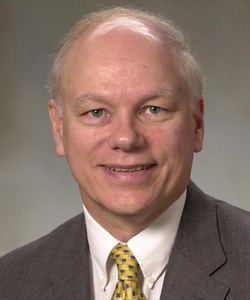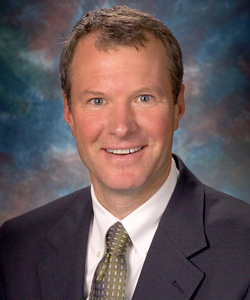April 3, 2013 – This month, candidates Robert Gagan (Green Bay) and Charles Hanson (La Crosse) will square off in an election for the State Bar of Wisconsin’s president-elect post. Recently, the State Bar conducted a Q & A with the president-elect hopefuls.
Ballots for president-elect will go out on or before April 12, as well as ballots for State Bar Board of Governors, State Bar treasurer, Wisconsin Judicial Council, and State Bar division president-elect posts. Learn more about all candidates at our elections page.
Winner of the 2013 president-elect position will serve a one-year term, starting July 1, 2013, before serving a one-year term as State Bar president starting July 1, 2014.

Charles Hanson

Robert Gagan
1. What is the most pressing issue facing Wisconsin lawyers today?
Hanson: We must maintain our focus on fulfilling our role as trusted advisors and advocates by keeping our practices current and competitive despite economic and technological challenges.
Gagan: I believe the most pressing issue facing Wisconsin lawyers is the attainment of some type of balance in our respective lives. Most of us became lawyers for altruistic reasons. While we appreciate the monetary rewards and prestige attendant to practicing law, for most of us there was also a desire to be in a position to make a difference.
However, we are now faced with an environment consisting of more lawyers coupled with an economic downturn. Many of us have been forced to work more hours to satisfy our employers, our law partners and ourselves. This often results in a corresponding decline in the quality of our familial relationships, our personal lives and our emotional health.
2. How would you propose the State Bar address it?
Gagan: There are two ways the State Bar can address this issue. We can first of all act as a catalyst and resource to help lawyers become more efficient. The State Bar can and should continue to act as a repository for all of the ancillary information we need to become better lawyers. We can thereby devote more time to both practicing law and much needed personal time.
The other method by which the State Bar can continue to address this problem is by continued emphasis upon and refinement of the Wisconsin Lawyers Assistance Program. In both my practice in Green Bay as well as my travels around the state, I have met many good lawyers who feel like they are being simply overwhelmed. They are good, caring people who often feel helpless or trapped. Depression, anxiety, alcoholism and a host of other problems are often caused or exacerbated by their law practices. We need to assure these colleagues that confidential help is available. By reaching out for help, they are courageously protecting their families, their clients, their firms and themselves.
Hanson: The State Bar can do the following: (1) work with other bar associations to identify significant trends affecting the practice of law and publicize the best ideas and new innovations to improve our practices; (2) develop and seek adoption of a meaningful proposal to address the unauthorized practice of law; (3) improve the public image of our profession by helping lawyers and local bar associations to better communicate the positive story of Wisconsin lawyers who not only work to seek justice for their clients, but also volunteer time to support their communities; (4) provide practical training in best usages of social media and technology to keep our practices current; (5) promote and help develop mentorship programs for new lawyers; and (6) advocate for adequate public funding for court-appointed lawyers, prosecutors, public defenders, and public interest lawyers serving the economically disadvantaged.
3. In your opinion, what makes a successful State Bar president?
Hanson: A successful State Bar President recognizes that any success is the result of many volunteers working together in common cause for the common good. I believe that effective bar leaders are servant leaders who provide focus, listen to diverse points of view, seek consensus, and use their position to support the volunteer lawyers doing the work of the various divisions, sections, and committees of our Bar Association.
Gagan: In a word – listening. In any leadership position, it’s important to be both approachable and flexible. During my time on the Board of Governors and the State Bar Executive Committee, I found that we were well served by the suggestions and opinions that were afforded to the State Bar by members both within and without Wisconsin. During my term as Brown County Bar President, I found that my actions were often guided as much by suggestions from colleagues as they were from my own predetermined opinions. Finally, and perhaps most importantly, while on the Board of Governors I have been in an excellent position to observe the balanced and nuanced approach to leadership exhibited by our current President and recent past State Bar Presidents.
4. How can the State Bar best serve its members?
Gagan: In addition to the assistance referenced in Question Two above, another method by which the State Bar can serve us involves acting as our advocate before the State Legislature. Occasionally, a legislator or a political appointee with an ax to grind will attempt to enact a regulation solely to punish our profession or our Law Schools. I expect the State Bar to be in the vanguard of resisting all such efforts.
Hanson: The State Bar can best serve its members by: (1) listening to their needs and responding with available resources; (2) providing quality benefits; (3) communicating the excellent services available and how to access them; (4) keeping abreast of the latest innovations in law practice and developing programs to help members improve their practices; and (5) advocating for our profession and its unique role in protecting democratic institutions, preventing and resolving disputes, and enhancing the fair administration of justice.
5. Aside from law practice experience, what unique qualifications would you bring to this position?
Hanson: Aside from 40 years practicing law, I have served as president of the La Crosse County Bar Association, as president of the Wisconsin Association of Worker’s Compensation Attorneys, and most recently, for the last four years on the State Bar’s Board of Governors. I also have worked with and lead a variety of community organizations. These include establishing four sister city groups (Russia, China, Norway and Ireland), Freedom Honor Flight (which brings WWII veterans to Washington, D.C.), the Brain Game (an early childhood development project), Junior Achievement, and Rotary (where I recently served as District Governor responsible for supporting 60 clubs across Wisconsin).
These projects are successful because they are inclusive, use participant feedback, and develop their goals through consensus. My experience leading many volunteer organizations has taught me what it takes to organize, motivate, and collaborate with diverse groups. This will help me serve you well as your next State Bar President-Elect. For more information on my leadership experience, please go to my law firm website.
Gagan: None of my qualifications are unique to only me.
Related
